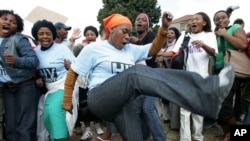As the deadly Ebola virus ravages West Africa and dominates headlines, Sibongile Tshabalala believes the Treatment Action Campaign is running out of steam at the worst possible time.
The South African AIDS advocacy group faces imminent shutdown over a budget shortfall of 10 million rand, about $900,000. It’s among the organizations striving to combat the global AIDS epidemic – and struggling even more as attention and funding have been diverted to Ebola, advocates such as Tshabalala say.
Tshabalala is the Treatment Action Campaign’s chairwoman for Gauteng province, whose capital is in Johannesburg. She agreed Ebola is “a crisis that everyone must deal with.”
But, she said, so is AIDS.
Global epidemic
Since emerging in 1981, the scourge has infected around 78 million people worldwide and killed at least 35 million by leaving them vulnerable to related illnesses, according to UNAIDS. The United Nations program estimates 35 million people worldwide today are living with HIV infection – at least 6 million in South Africa alone.
But, Tshabalala said, "Funders feel that HIV is no longer a sexy disease that they can fund. However, we still have a lot of people who are dying because of AIDS-related diseases."
Last year in South Africa, roughly 200,000 people died of AIDS-related illness, UNAIDS estimated. That’s an average of 548 deaths a day.
'That tells us that we haven’t won the fight against HIV yet," Tshabalala said.
World AIDS Day approaches
The Treatment Action Campaign has until December 1 – World AIDS Day – to raise more money. Despite some generous pledges, it’s still far from its goal.
Its financial crash was caused by the pullout of major foreign government sponsors who now deem South Africa to be a middle-income nation and therefore no longer in need.
South Africa also has the world’s largest AIDS medication program.
Ebola is a swift killer: Many patients die in days or weeks, in horrible pain, and there is no cure.
AIDS can now be a lifelong condition instead of a death sentence, thanks to medical advances. But that doesn’t make AIDS any less dangerous.
The current Ebola outbreak had taken at least 5,459 lives as of November 18, averaging almost almost 17 a day, based on data provided by the World Health Organization. In contrast, AIDS worldwide averaged 3,835 deaths a day last year, according to UNAIDS data.
Inadequate health system
Dr. Frew Benson, chief director of communicable diseases for South Africa’s National Department of Health, said his nation has fended off Ebola before, in 1996. The first patient, a nurse, was effectively treated and did not provoke an outbreak.
The same factors behind Ebola’s growth in West Africa – poverty, poor medical facilities and lack of sanitation – also have boosted deadly diseases such as HIV/AIDS, malaria and tuberculosis.
"Ideally, you should have a health system that’s resilient, that’s strong, that is able to absorb not only one of the formidable diseases when it comes along [but] even everyday diseases like hypertension, diabetes," Benson said. "At the moment, more people die from these diseases in South Africa than in the current Ebola outbreak.
"So I think one of the biggest lessons is that if you have a health system that’s strong, that’s where your investment needs to lie."
Campaigning for improvements
The TAC has campaigned for better health facilities since its founding in 1998, Tshabalala said.
Its clinics are small and don’t have sufficient infection control, she said. "People have to go in one room – one waiting room," she said. "… If that person who has TB is there and they cough, everyone who is in that room will get infected."
Donations to the TAC won’t only help those with HIV, Tshabalala said. “I will ask them to give that money to advocate for better health services … for everyone who lives in South Africa.”
Campaigns to fight both of these deadly, but very different, diseases have the same mission: to curb infection, improve services and save lives.




